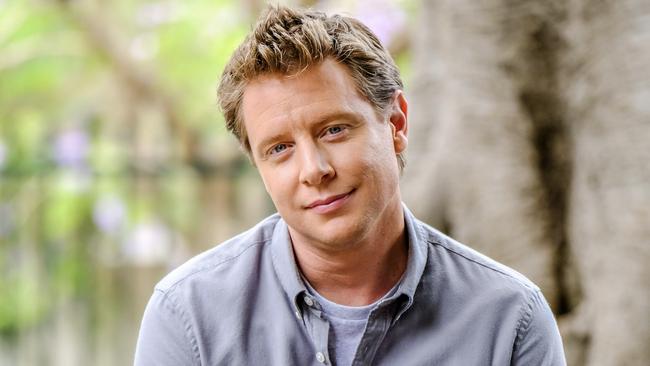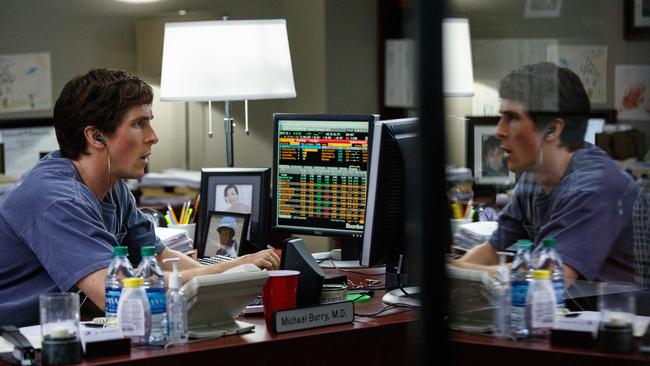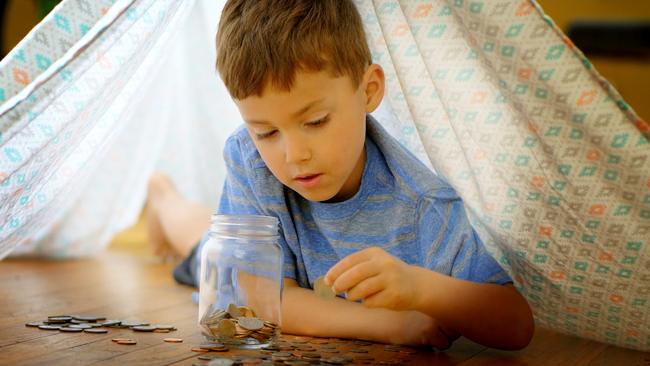Barefoot Investor: Secret to happiness lies in how you splash your cash
The big lesson from this pandemic is that the world is far too complex to predict anything — but investing and saving is the ultimate act of optimism.

Barefoot Investor
Don't miss out on the headlines from Barefoot Investor. Followed categories will be added to My News.
Just in case this ever leaks, I need to make a confession: this year I’ve been doing some “side hustle” work as a garbo.
It all began in lockdown when I was looking for an excuse to get out of the house.
A mate of mine has a rubbish removal business and asked whether I’d like to tag along on some of his jobs.
How could I say no?
There’s something about hydraulics, a mate to talk rubbish with, and snooping on people’s trash that really revs my engine.
“I could make a killing by selling a paparazzi shot of you picking up rubbish,” teased my mate.
“I can see the headline now: ‘Barefoot investor goes broke, becomes a GARBO’.”
Yet there was an ulterior motive: I have been decking out a barn (read: man cave) on the farm, so I was keeping a lookout for any discarded gems.
As we toured the suburbs dropping off giant skip bins, it was clear that a lot of people had been inspired to do a Marie Kondo clean-out over lockdown.
But you know what was really weird?
I was expecting to find loads of old junk.
Yet most of the furniture being chucked wasn’t that old … and the people who’d chucked it would have paid a pretty penny for what had quickly become semi-disposable Swedish furniture.
For my man cave I wanted something that would last. So on the weekend I went shopping for a “good” sofa, and I met possibly the most honest furniture salesman in Melbourne.
“Is it leather?” I asked, pointing at a classy-looking chesterfield.
He looked at me, smiled, and shrugged his shoulders.
“Honestly? It’s spat out of a factory in China. It could be made of rat for all I know. But it looks good, right?”
(He was only slightly joking. Consumer group CHOICE says — incredibly — that there is no one definition of leather.)
“Look, mate, no one makes anything here in Australia anymore,” the salesman said to me emphatically. “It’s too expensive. Everything is made in China. EVERYTHING.”
That was like waving a red rag to a ... rat?
Eventually, after much googling, I found a furniture-maker in Melbourne who has spent decades honing his craft. So I gave him a call.
“How can I ensure you’re putting real leather on my sofa?” I quizzed him.
“Well, how about we go pick out the hide together?” he said.
Hardcore.
Now I know what you’re thinking: “Not everyone has the coin to get something custom made, Barefoot!”
And I agree — which is why, in addition to getting a sofa made, I’ve also been hunting for restored antique furniture on the cheap off eBay (for the man cave).
The sort of stuff that was built in a different era, long before everything was created to be flat-packed on a ship from China.
My thinking: I not only want to be sustainable for the planet, I want to buy something that will outlast me — and support Aussie jobs to boot.
Yes, it will cost more.
But, then again, so does paying good money for average stuff and paying two dudes to cart it away every few years.
Tread Your Own Path!

HYPERINFLATION COMING
I am one of those 20-something Reddit users who makes some “tendies” off GameStop. Most of my meagre net worth is in a high-interest savings account and an ETF (exchange-traded fund) as I save for a home deposit.
But I have something that really should get your attention: hyperinflation.
It is gaining massive traction on WSB (Wall Street Bets, on Reddit), and it is not your average conspiracy theory.
Even Michael Burry (of The Big Short fame) is talking about it.
They are likening our current financial climate to the hyperinflation seen in post-WW1 Germany. What do you make of it?
Harry
Harry, I’m not going to rule out hyperinflation.
Heck, after the last 12 months I’m not ruling anything in or out.
After all, who would have thought we’d be locked in our homes for the better part of the year?
One lesson I’ve taken from our annus horribilis is to be humble: the world is far too complex for us to accurately predict anything.
Another lesson is to stop reading online articles designed to scare the clicks out of you.
Instead, I’m going to suggest three books for you to read:
The first is When Money Dies. Author Adam Fergusson tells the shocking story that Germany faced post WW1 ... where a loaf of bread skyrocketed from 160 marks in 1922 to 200 million marks by 1923.
Fergusson has since reassured readers that no advanced economy will hit hyperinflation anywhere near the level he writes about.
Yet it doesn’t have to: even sustained double-digit rates of inflation can ruin people’s lives. And that to me is the message of this book.
The second is The Great Depression: A Diary by Benjamin Roth — one of my all-time favourite books.
It’s the actual diary notes of a lawyer living through the Great Depression (what makes it fascinating is that he doesn’t know he is).
His writing paints a very different situation to the one we are in now: in the Depression the average person had next to no money.
Today we’re flush with cash.
The final one is The Rational Optimist. Author Matt Ridley convincingly argues that, contrary to the doom-and-gloomers, the world is actually getting better. And it is.
The best time to be alive is right now.
Harry, investing and saving — and living — is the ultimate act of optimism. So be bold!
SHOW ME THE MONEY
We have three boys, aged 6, 3 and 0, and I would love to introduce your “Jam Jars” with them.
But, once we buy the jars (and polish off the jam), where are all these “coins” coming from in a world of plastic banking?
When was the last time you had a wallet full of coins?
Brendan
Brendan, I don’t have a wallet full of coins. In fact I don’t have a wallet — I use my Apple Watch.
However, kids are visual creatures, so nothing works as well as shiny coins that clink as they hit a glass jar.
Now to your question: where do I find these relics?
It’s actually not that hard. Every so often when I’m at the supermarket I’ll get $50 in coins, then store them in a tupperware container at home.
Another tip: you may not need a wallet anymore, but your kids do, and you should keep their wallets in your car.
That way the next time they bug you for something they can pull out their wallets, count up their money, and buy it themselves.

BAREFOOT, THE FIRE STARTER
Scott, because of you, we started a fire in our neighbour’s yard!
We dominoed our debts (18 months ahead of schedule) and burnt our loan statements just like you advised ... which flew over the fence into our neighbour’s yard and started burning. Anyway, thanks to you, we can now put an extra $2000 a month into our home loan and continue working our way to being debt free.
Bec
So you did the bill-burning ceremony, congratulations!
We all need to celebrate these achievements (even if it occasionally leads to an arson charge).
A lot of unhappiness comes from trying to keep up with the Joneses … yet not in this case.
Your neighbours are on fire!
The Barefoot Investor for Families: The Only Kids’ Money Guide You’ll Ever Need (HarperCollins) RRP $29.99
Information and opinions provided in this column are general in nature and have been prepared for educational purposes only. Always seek personal financial advice tailored to your specific needs before making financial and investment
Got a money question or a story to share? Go to barefootinvestor.com and #askbarefoot
Originally published as Barefoot Investor: Secret to happiness lies in how you splash your cash


